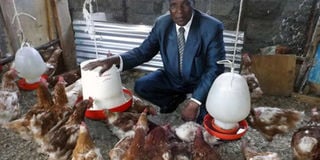Diary of a Poultry Farmer: Price every farmer must be ready to pay

Sammy Mugo feeds his chicken in his farm in Ol Kalou, Nyandarua County. PHOTO | JOHN GITHINJI | NATION MEDIA GROUP
What you need to know:
- Infectious coryza and mycoplasma are fastidious diseases and if the infections are widespread, you may be required to depopulate the flock to break the infection cycle once and for all.
- Now, what I have been doing since December was to maintain a separate pen to isolate all birds showing signs of diseases. I have been disposing the other healthy ones slowly, with the last batch going last week.
- As time flies, I only hope that my business will be back on track. More importantly, however, I will have birds to sell for meat during the Christmas holidays.
I normally visit my farm every weekend because during the week I am away at work.
So every Saturday, and sometimes Sunday, you will find me on the farm checking on the birds’ progress, among other things.I have maintained this trend even after disposing off my birds as I tried to fight infectious coryza and mycoplasma, two stubborn diseases that threatened my business.
Last Saturday was not any different. As I sauntered around the farm, Cleophas my farm manager told me I had a female visitor at the gate.
Now, just in case you haven’t been to my farm in Njiru on the outskirts of Nairobi recently, I have been undertaking major structural changes to beef up security and improve farm hygiene.
At the two main gates, I have placed footbaths where cars and people get disinfected before getting in.
Then there are footbaths at two small gates where all pedestrians pass. In total, there are four gates, two big and two small ones.
I made the changes to protect my business for the long-term, but the measures have come at a huge financial cost. All in all, the investment is worth it.
However, as I make the structural changes, I am counting losses in terms of missed opportunities.
The female guest that Saturday had visited my farm to buy day-old chicks, but she left disappointed when I informed her I had not hatched any in weeks.
Ambayo Willis, another client, too called placing an order for 528 fertile eggs for incubation. I sell each at Sh20 and counted my losses as I told him that I could not supply at the moment.
BREAK THE CYCLE
You see, my vet advised me to leave the chicken houses unoccupied for at least three months to break disease cycle.
He arrived at the decision after all measures we put in place to curb the two diseases failed. Initially, when I first consulted Dr Mugachia, the vet surgeon, I had lost 136 chicks.
At the time, he had warned me, saying: “Infectious coryza and mycoplasma are fastidious diseases and if the infections are widespread, you may be required to depopulate the flock to break the infection cycle once and for all.”
He later visited three times and prescribed some treatment.
Although the infection seemed to have subsided, I continued to lose birds and by end of last year, I had lost 594 (a 72 per cent mortality rate).
The cost of treating the birds had further outstripped the benefits. You see, I spent over Sh35,000 on consultation and drugs alone.
Now, what I have been doing since December was to maintain a separate pen to isolate all birds showing signs of diseases. I have been disposing the other healthy ones slowly, with the last batch going last week.
So, the losses arising from missed opportunities would be huge by the time my business is back on track. When I was starting, I was never prepared for such an eventuality, but reality is some things you learn on the job.
NEVER TO TAKE CHANCES
From next week, I will start to disinfect the entire premises and leave it empty for at least three months. The temptation to bring in new stock as soon as possible to minimise losses has been high in the last weeks. But when it comes to farm diseases, I have learnt never to take any chances.
As I go on with the plan, I have placed an order at Kalro, Naivasha, for day-old chicks, which they promised to deliver in three months.
The good thing is that I have put up a new wing which can accommodate the new stock in the meantime.
As time flies, I only hope that my business will be back on track. More importantly, however, I will have birds to sell for meat during the Christmas holidays.
***
Your Questions Answered
Steven Ochieng: I have observed irregular laying patterns and poor brooding of my Kienyeji chickens. What is the cause?
First, I need to know if you are rearing improved Kienyeji chicken (Kari/Kuroiler) or the local free-range Kienyeji.
Apart from quality of feeds, irregular laying could be as a result of poor light management when the birds are young.
I have also observed total lack of broodiness in the last batch of Kari Improved Kienyeji birds that I bought in August 2016. It is something I am still investigating.
Maureen Ong’ombe: Share a basic handout on rearing chicken for starters.
Please send me email for a free copy.
Kenneth Kipkorir: I am requesting for all your past articles featured in the Seeds of Gold.
Please get in touch with Nation library or search online under Diary of Poultry Farmer tag.
Gates Anthony: I read an article you wrote on August 20, 2016 and would like a free hand out on poultry for beginners.
Please send me an email for a copy.





